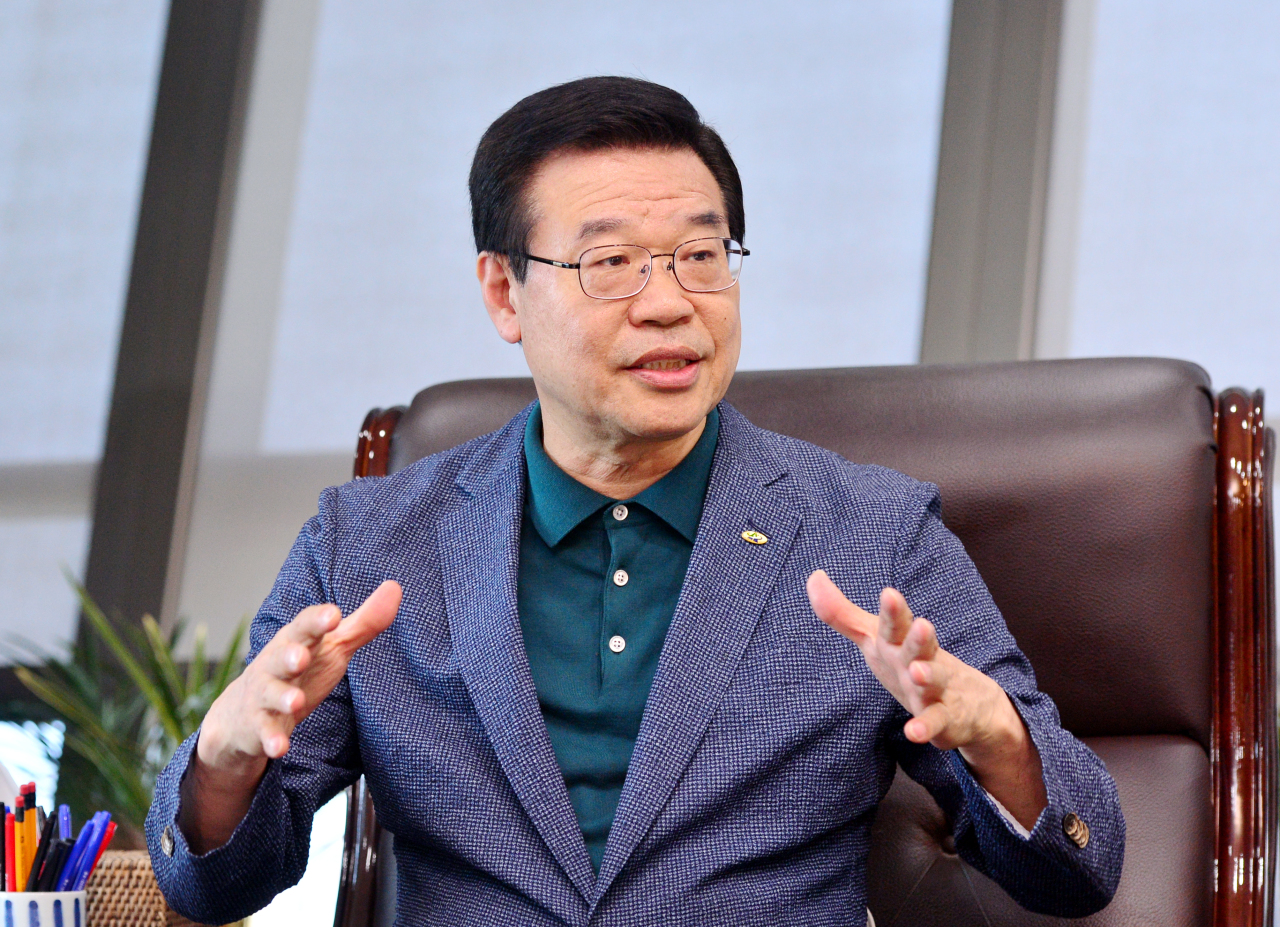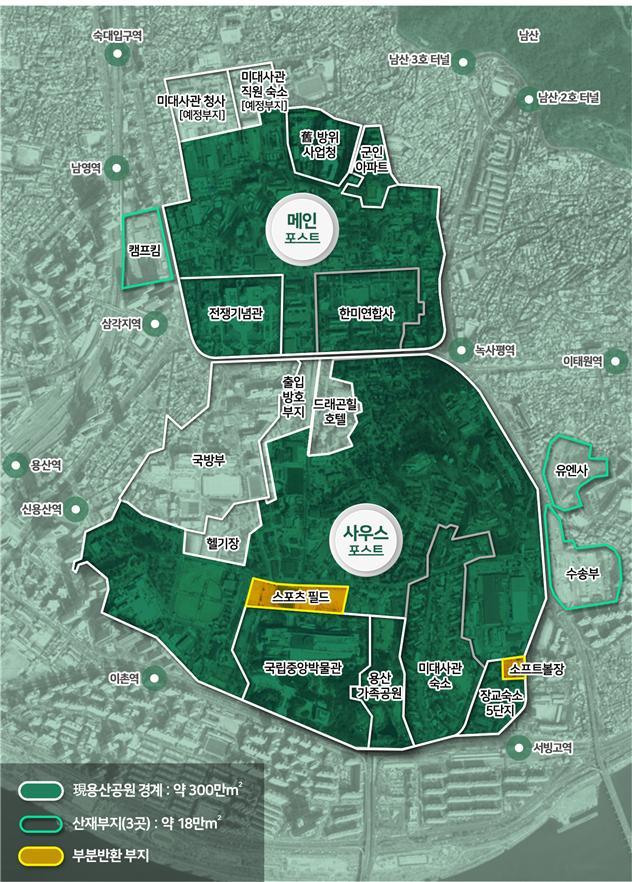[Herald Interview] ‘US-owned hotel should be moved out of proposed Yongsan park’
District mayor says retention of Dragon Hill Lodge does not help Korea-US alliance
By Shin Ji-hyePublished : May 23, 2021 - 12:14

Yongsan-gu mayor said that a US military resort hotel in the city should be out of an envisioned national park slated to open within a decade.
Upon the agreement made between Korea and the US in 2003, the US Forces Korea headquarters and the United Nations Command moved to Pyeongtaek in 2018, ending the US military presence in the city. In 2005, the Korean government announced plans to build the nation’s first urban national park in the area by 2027.
“The land occupied by foreign troops -- Japan and the US -- for nearly 140 years is now being returned,” said Sung Jang-hyun, the mayor of Yongsan-gu, in an interview with The Korea Herald.
“On the land with a huge history, pain and resentment, the park should be created in a way that we don’t feel ashamed of for future generations,” he said.
The first task he sees is to move the military resort hotel outside the proposed park.
Although most military facilities moved to Osan and Pyeongtaek, some, including a heliport, a protective facility for the heliport and Dragon Hill Lodge for US troops, remain at the Yongsan base. The US Embassy will also be relocated from Jongno-gu, Seoul to Yongsan.
“It is understandable that necessary facilities, such as a heliport and a protective facility, should be reserved for the alliance and military operational needs of the two countries. But, the resort hotel should not remain. It should be moved out of the park,” Sung said.
Upon the agreement made between Korea and the US in 2003, the US Forces Korea headquarters and the United Nations Command moved to Pyeongtaek in 2018, ending the US military presence in the city. In 2005, the Korean government announced plans to build the nation’s first urban national park in the area by 2027.
“The land occupied by foreign troops -- Japan and the US -- for nearly 140 years is now being returned,” said Sung Jang-hyun, the mayor of Yongsan-gu, in an interview with The Korea Herald.
“On the land with a huge history, pain and resentment, the park should be created in a way that we don’t feel ashamed of for future generations,” he said.
The first task he sees is to move the military resort hotel outside the proposed park.
Although most military facilities moved to Osan and Pyeongtaek, some, including a heliport, a protective facility for the heliport and Dragon Hill Lodge for US troops, remain at the Yongsan base. The US Embassy will also be relocated from Jongno-gu, Seoul to Yongsan.
“It is understandable that necessary facilities, such as a heliport and a protective facility, should be reserved for the alliance and military operational needs of the two countries. But, the resort hotel should not remain. It should be moved out of the park,” Sung said.

“If the hotel, which will be located in the center of the park, continues to exist, we should build separate roads, and block the road and hotel with either walls or barbed wire in order to prevent ordinary people from entering,” he said.
“If so, the north side of the park will be blocked for the US embassy, the other side will be blocked for the heliport and protective facility and the central part will be (occupied by) the hotel. What kind of park is this?”
Sung said he came up with a good plan -- without specifying it -- to move the hotel outside the park and within Seoul.
“We brought the plan to the central government but the government has expressed some reluctance,” he said, without elaborating further details.
He still plans to continue to persuade the government and hoped the government would take this seriously with a will.
The presence of the hotel in the middle of the national park is not helpful even for the alliance of the two nations, the mayor said, adding, “What would millions of families and children think when they visit the park?”
Another task that should be addressed is to restore the contaminated soil in the base caused by the presence of the military base, he said.
“The soil is very contaminated. This should be restored first (before creating a park),” the mayor said.
“Oil continued to be leaked near Noksapyeong Station but information about pollution is not properly shared (by the US base). There is no information about how contaminated the land is, how much it costs to clean it and who will bear the costs.”
Seoul city has filed lawsuits four times against the state asking for compensation as the site of Noksapyeong Station was continuously contaminated by oil leaks from nearby US military units. It has won all of the cases.
“If you plant trees and raise fish in contaminated areas, will they grow?” he asked, adding, the two nations should participate in the discussion and fully investigate to find answers until there is no doubt left,” mayor said.
So far, the Ministry of National Defense has paid about 220 billion won ($194 million) for the 24 returned bases that have completed the cleanup. It is expected to cost about 1 trillion won to clean up 80 US military bases.
By Shin Ji-hye (shinjh@heraldcorp.com)
“If so, the north side of the park will be blocked for the US embassy, the other side will be blocked for the heliport and protective facility and the central part will be (occupied by) the hotel. What kind of park is this?”
Sung said he came up with a good plan -- without specifying it -- to move the hotel outside the park and within Seoul.
“We brought the plan to the central government but the government has expressed some reluctance,” he said, without elaborating further details.
He still plans to continue to persuade the government and hoped the government would take this seriously with a will.
The presence of the hotel in the middle of the national park is not helpful even for the alliance of the two nations, the mayor said, adding, “What would millions of families and children think when they visit the park?”
Another task that should be addressed is to restore the contaminated soil in the base caused by the presence of the military base, he said.
“The soil is very contaminated. This should be restored first (before creating a park),” the mayor said.
“Oil continued to be leaked near Noksapyeong Station but information about pollution is not properly shared (by the US base). There is no information about how contaminated the land is, how much it costs to clean it and who will bear the costs.”
Seoul city has filed lawsuits four times against the state asking for compensation as the site of Noksapyeong Station was continuously contaminated by oil leaks from nearby US military units. It has won all of the cases.
“If you plant trees and raise fish in contaminated areas, will they grow?” he asked, adding, the two nations should participate in the discussion and fully investigate to find answers until there is no doubt left,” mayor said.
So far, the Ministry of National Defense has paid about 220 billion won ($194 million) for the 24 returned bases that have completed the cleanup. It is expected to cost about 1 trillion won to clean up 80 US military bases.
By Shin Ji-hye (shinjh@heraldcorp.com)




![[Herald Interview] 'Amid aging population, Korea to invite more young professionals from overseas'](http://res.heraldm.com/phpwas/restmb_idxmake.php?idx=644&simg=/content/image/2024/04/24/20240424050844_0.jpg&u=20240424200058)















